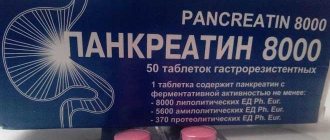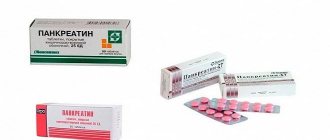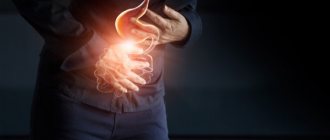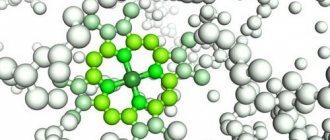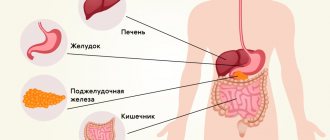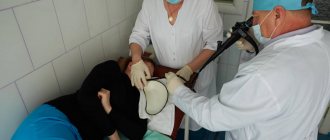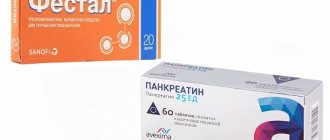Components and dosage form
Pancreatin is sold in tablets. There are ten pieces in a blister, 60 pieces in a polymer bottle. One tablet contains thirty units of proteolytic enzyme action.
Pancreatin Forte is also sold in pharmacies. The medicine contains action units: amylase - 4620, protease - 275-500, lipase - 3850. One bottle contains 20, 30 or 60 tablets, and ten tablets are dispensed in a blister pack.
For what diseases is pancreatin prescribed?
Remember, even if your disease is on the list below, you do not need to self-medicate and prescribe pancreatin yourself, like any other drug. Before starting treatment and using the drug, consult your doctor and make sure that you do not have any individual intolerance to its components, as well as other contraindications for using the drug.
So, for what diseases and in what situations is pancreatin used?
- First of all, this is, of course, the treatment of chronic pancreatitis. Pancreatin itself or drugs based on it are always involved in the treatment of this disease;
- The recovery period after surgery to remove part of the intestine or stomach;
- In case of damage to the jaw or teeth that impede chewing function;
- For bloating, increased gas formation and flatulence;
- Pancreatin is also prescribed to people who lead a sedentary lifestyle and at the same time consume excess amounts of food (overeating);
- In preparation for x-rays or ultrasound of the gastrointestinal tract;
- In the treatment of inflammatory processes in the gallbladder and liver;
- In the treatment of gastritis;
- In the treatment of cystic fibrosis;
- To restore the functions of the pancreas after its transplantation and other operations;
- Prescribed to older people suffering from age-related digestive problems;
- During pregnancy;
- When treating diarrhea, when it is not caused by infection;
- To normalize digestion in patients forced to remain in bed for a long time.
Mode of application
To determine whether Pancreatin will be effective before or after meals, you need to understand the features of the medicine. It contains active components that the body does not need all the time, but only to digest food.
For this reason, taking Pancreatin before meals will not only be ineffective, but also unsafe . Active components help digest food. If the stomach is empty, enzymes can eat away the mucous membranes. This is dangerous due to the formation of erosions.
The dosage depends on the disease and the age of the patient. The manufacturer gives dosages in terms of lipase. Adults are advised to take no more than 150,000 units of action per day.
If the pancreas does not produce enzymes at all to digest food, 400,000 units per day are needed. This is a daily need for a person.
The maximum dose per day should be no more than 15,000 units per kilogram of body weight. A child under 1.5 years old - 50,000 units per day, from 1.5 years old - twice as much.
Only during or immediately after meals, taking Pancreatin will be effective and will not harm the stomach. Drink alkaline water correctly in large quantities - at least one glass. The tablets should not be chewed - they can damage the mucous membranes of the mouth due to the content of active ingredients.
How to drink pancreatin for adults: regimens, dosage and course of treatment
The main purpose of the drug Pancreatin is to compensate for the deficiency of pancreatic enzymes. Medicine is required for diseases of both the gland itself and other digestive organs that cause reactive pancreatitis.
It is often used to restore food digestion and eliminate symptoms of disorders due to poisoning, overeating heavy or unusual foods, and alcohol intoxication.
The absorption capacity of the intestine and the body’s receipt of substances important for life depend on how to take Pancreatin.
The medicine is available in enteric-coated tablets. It is extracted tissue from the pancreas of pigs (closest in structure to human enzymes). The choice of the correct dose is determined by the patient’s specific pathology and age. You should take the drug only after consulting a doctor, having first read the instructions.
Features of the diet during treatment with enzymes
If insufficiency of pancreatic function is suspected, then nutrition is tailored taking into account the stage of the inflammatory process or the main nosology that caused the failure.
For a practically healthy person, it is important to ensure a rational load on the organ.
Nutritionists recommend forming a diet from a variety of foods, and not overloading the digestive tract with heavy fatty and fried foods, meat, smoked meats, and seasonings.
Digestion is negatively affected by fast food, chips, foods with preservatives, confectionery, and sweets. Even in the absence of pathology, moderation must be observed. After 45 years, food requirements increase. The amount of enzymes produced per day during overeating is not capable of breaking down the incoming food.
In addition to the pancreas, enzymes are produced by the liver and secreted into bile; gastric juice pepsin processes the mass. Nutritionists consider the amount of food consumed by a person in 20 minutes to be sufficient. Everything else is excess, leading to stress on all organs.
The main rules of nutrition while taking enzymes:
- do not overeat, eat 5-6 times a day, do not overload your stomach at night,
- portions should be ½ of the norm,
- exclude the preparation of dishes by frying, smoking, use only boiled and stewed products,
- in the presence of chronic diseases, food should correspond to the dietary table.
In case of acute pancreatitis, fasting is prescribed in the first days, then mucous porridges, thin, non-rich soups, boiled meat minced into mince, and steamed omelettes are given. Dietary expansion is always supported by the administration of enzymes.
You will have to give up these products forever:
- alcohol, soda, strong coffee,
- fried foods,
- fatty rich broths and soups,
- mushrooms in any form,
- legume porridges,
- fresh baked goods,
- greenery,
- spicy seasonings,
- chocolate and other sweets.
Taking the drug for the purpose of prevention
Most often, exacerbations of chronic pancreatitis and gastrointestinal diseases are associated with non-compliance with diet, stressful situations, and alcohol. Patients are recommended to take Pancreatin for prevention, for example, 2 weeks before a festive feast or a planned busy period. It will not be possible to stock up on enzymes in advance, but you can put the functional state of the gastrointestinal tract in order.
Pharmacological properties
When you need to take the tablets for them to be as effective as possible depends on their active ingredients and properties. Pancreatin contains active enzymes necessary for a person to complete the digestion process.
The preparation contains enzymes for the breakdown of carbohydrates, lipids and peptides supplied with food. Usually the pancreas is responsible for the production of enzymes, but if its functions are impaired, the secretion is produced in insufficient quantities or not produced at all.
In this case, Pancreatin is prescribed, which contains:
- lipase – a catalyst for the processes of dissolution and absorption of fats;
- amylase is an enzyme necessary for the decomposition of glycogen and starch;
- protease – necessary for the breakdown of protein molecules.
Enzymes in the drug break down nutrients supplied with food, improving their absorption in the small intestine. The drug is effective not only for chronic secretory diseases, but also for episodic disorders. For example, when overeating, eating unusual foods, or combining fatty and vegetable foods.
Use of Pancreatin during pregnancy and breastfeeding
The answer to this question cannot be unambiguous. But, if a woman during lactation or pregnancy has a problem associated with a disorder of the digestive system and she does not have any indicators of intolerance to individual components of Pancreatin, then this method of treatment may help.
The main thing in this case is to strictly follow the instructions prescribed by your doctor. The period of gestation is the most dangerous for both the baby and the mother. Failure to follow the rules can lead to the development of pathologies.
Interview with Gennady Malakhov about wax-cream Zdorov
“...I want to touch on one of the important topics of intimate illness. We will talk about hemorrhoids and their treatment at home...”
Read more{amp}gt;{amp}gt;{amp}gt;
When is the drug prescribed?
Pancreatin is prescribed for the following conditions and pathologies:
- inflammation of the pancreas in remission;
- cystic fibrosis;
- chronic diseases of the hepatobiliary system;
- remission of pathologies of the digestive tract;
- gastrointestinal upset after irradiation or resection;
- preparation for instrumental examination.
Pancreatin is effective for atrophic and inflammatory diseases of the stomach in remission. It can also be used for occasional stomach upsets after an unusual meal. In this case, the duration of treatment is up to three days. With complex therapy, the duration of treatment is determined by the doctor.
Side effects and contraindications
Adverse effects in most cases are expressed in the appearance of allergic reactions of varying severity (depending on the individual characteristics of the body).
Also, when treated with Pancreatin for a long period of time, there is a risk of developing hyperuricemia and hyperuricuria (increased levels of uric acid in the blood and urine, respectively).
- The drug is not used in the treatment of acute pancreatitis and during exacerbation of chronic pancreatitis.
- Also, if you have hypersensitivity to the components of Pancreatin, you should refrain from using it.
Taking medication on an empty stomach
Taking Pancreatin on an empty stomach is contraindicated. The enzymes in the medicine are designed to break down food. If there is no food in the stomach, they begin to have a destructive effect on the mucous membranes of the stomach.
In a healthy body, the production of enzymes begins during food intake. That is why it is correct to drink Pancreatin during meals or immediately after. The active ingredients are used to break down the incoming food and will not harm the stomach.
On an empty stomach, drugs are usually prescribed that do not have a destructive effect on the mucous membranes or promote their healing. Pancreatin is taken as many times a day as you eat - 3-5 times, depending on the diet.
Contraindications and side effects
Pancreatin is the most popular enzyme preparation, but it should absolutely not be used in the presence of the following pathologies:
- acute pancreatitis;
- individual intolerance to components;
- intestinal obstruction;
- acute form of hepatitis.
Pancreatin is also contraindicated for children under 2 years of age.
Side effects can manifest themselves in different ways:
- bowel dysfunction in the form of diarrhea or constipation;
- allergic rashes;
- pain in the stomach accompanied by nausea;
- headache with dizziness.
If one of the signs appears, you should stop taking the drug and consult a doctor.
Pancreatin is prescribed for secretory disorders in the digestive tract. Not only the effectiveness, but also the safety of treatment depends on correct use. Therefore, you first need to clarify whether it is correct to take Pancreatin before or after meals.
Pancreatin - analogues
This pharmacological agent has many synonyms and generics that are effective against the same diseases as the original. Choosing whether to take Pancreatin or Mezim, or other enzyme agents in a particular case, must be done on the advice of a doctor and based on your own feelings. Sometimes an absolutely similar medication is better tolerated and works faster. Synonyms that are effective for the same conditions that Pancreatin helps with:
- Zentaze;
- Creon;
- Pancitrate;
- Enzibene;
- Innozyme;
- Panzinorm;
- Eurobiol;
- Festal;
- Ajizim;
- Pangrol;
- Hermital;
- Mezim;
- Penzital;
- Fermentium;
- Enzistal;
- Micrasim;
- Panenzyme;
- Digestal and others.
Pancreatin - composition
The active components of the drug are digestive enzymes secreted by the pancreas:
They are obtained from the organs of animals, mainly cattle and pigs. Pancreatin tablets also contain auxiliary ingredients:
- sodium chloride and croscarmellose;
- microcrystalline cellulose;
- magnesium stearate;
- colloidal silicon dioxide;
- macrogol 4000;
- oydragit L30 D-55 or L-100;
- talc;
- titanium dioxide;
- red food coloring.
